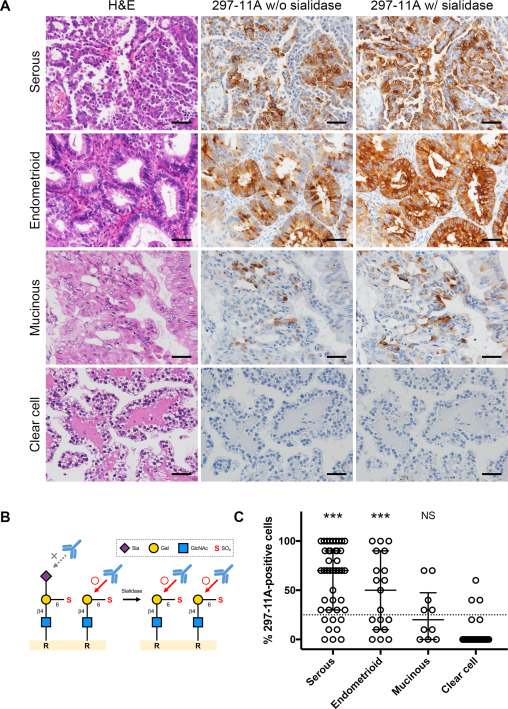
 中央研究院 生物化學研究所
中央研究院 生物化學研究所
Ovarian carcinoma is usually diagnosed at an advanced stage with peritoneal dissemination and/or lymph node metastasis, and the prognosis for such advanced carcinoma is very poor. Therefore, new biomarkers to predict patient prognosis are needed. Miyamoto et al. previously showed that keratan sulfate (KS) detected by the 5D4 monoclonal antibody was expressed in ovarian carcinoma. However, the detailed structure of such KS was not determined, and the biological significance of this finding remained to be clarified. We previously generated the 297-11A monoclonal antibody, which recognizes galactose (Gal)-6-O-sulfated N-acetyllactosamine (LacNAc) located at the non-reducing terminus. Since the 297-11A epitope overlaps with that of 5D4, here we chose to use the 297-11A antibody as a tool to analyze KS and related structures. We conducted immunohistochemical analysis of 98 ovarian carcinoma cases with 297-11A antibody combined with a series of glycosidases and performed mass spectrometry analysis of the human serous ovarian carcinoma cell line OVCAR-3 to deduce the glycan structure of 297-11A-sulfated glycans. We also performed western blot analysis to assess a potential association of 297-11A-sulfated glycans with the mucin core protein mucin 16 (MUC16; also known as cancer antigen 125 (CA125)). Finally, we examined the relationship between 297-11A expression and patient prognosis. Consequently, 297-11A-sulfated glycans were primarily expressed in serous and endometrioid carcinomas and poorly expressed in mucinous and clear cell carcinomas. We reveal that structurally, 297-11A-sulfated glycans expressed in ovarian carcinoma are O-glycans carrying partially sialylated, Gal-6-O-sulfated LacNAc and that these glycans are likely displayed on MUC16 mucin core proteins. Of clinical importance is that expression of 297-11A-sulfated glycans correlated with shorter progression-free survival in patients. Thus, 297-11A-sulfated glycans may serve as a predictor of ovarian carcinoma recurrence.
